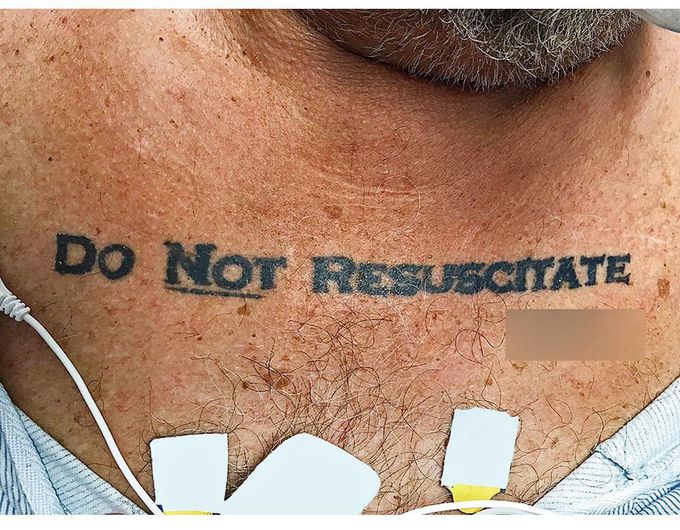

What would you do?
An unconscious man came to a hospital with a 'do not resuscitate' tattoo, and doctors didn't know what to do!! A bit of a dilemma - what would you do? This 70-year-old man, with history of chronic obstructive pulmonary disease, diabetes, and atrial fibrillation, came to a Florida emergency room unconscious, with no identification, and an elevated blood alcohol level. Doctors tried to bring the man to consciousness but couldn't. It was a complicated situation made even more complicated by a tattoo on his anterior chest that read “Do Not Resuscitate,” accompanied by his presumed signature. All efforts at treating reversible causes of his decreased level of consciousness failed to produce a mental status adequate for discussing goals of care. Meanwhile, he was placed on empirical antibiotics, received intravenous fluids and vasopressors, and was treated with bilevel positive airway pressure. The ethics consultants advised to honor the patient’s do not resuscitate tattoo. They suggested that it was most reasonable to infer that the tattoo expressed an authentic preference. This patient’s tattooed request produced more confusion than clarity, but doctors were relieved to find he had also legally filed a written ‘Do not resuscitate’ order. The patient’s clinical status deteriorated throughout the night, and he died without undergoing attempts at resuscitation with cardiopulmonary respiration or advanced airway management. Case by NEJM
I remember this story. The family later told the hospital staff that it was truly his wish to be DNR and that they did the right thing. He had extensive medical issues. I would do the same, the tattoo was right where it couldn't be ignored, it was very thought out and purposeful.
Sometimes people have reached their limit and should be allowed to forgo intervention. I remember one patient whose 4th dialysis graft failed and he decided not to undergo getting another one. People were upset about it, but if you talked to him, he was tired. He didn't want anymore dialysis or surgeries. I also remember my grandfather at almost 102 years old asking what he had to do to die. Sometimes death isn't the worst thing that can happen.
Ambulance service policy at the moment is to continue compressions and resuscitation efforts unless the actual DNAR form is presented, in date and signed by a senior clinician. In a pre- hospital setting, even with identification, paramedics are putting themselves at risk legally by following the DNAR tattoo without being able to see the physical documentation in person. I’m not sure how that translates to a clinical/in-hospital setting but thought it might be helpful to mention.
